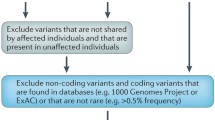Abstract
Genetic disease in humans is frequent; about 4% of all newborns suffer from an inherited disease or an inherited predisposition to a certain disease. About 4000 Mendelian-inherited traits have been described to date, the vast majority of them being rare. The analysis of these diseases and of the genes involved in the pathophysiology has had little success so far, neither by traditional biochemical methods nor by new reverse genetic approaches. Nevertheless the investigation of these naturally occuring mutations offers a tremendous potential gain of knowledge not only about the etiology of these diseases but also about the normal development and physiology of humans.
Access this chapter
Tax calculation will be finalised at checkout
Purchases are for personal use only
Preview
Unable to display preview. Download preview PDF.
Similar content being viewed by others
References
Boerwinkle E, Xiong W, Fourest E, Chan L (1989) Rapid typing of tandemly repeated hypervariable loci by the polymerase chain reaction: application to the apolipoprotein B 3’hypervariable region. Proc Natl Acad Sci USA 86:212–216
Kerem B-S, Rommens J M, Buchanan J A, Markiewicz D, Cox T, Chakravarti A, Buchwald M, Tsui L-C (1989) Identification of the cystic fibrosis gene: genetic analysis. Science 245: 1073–1080
Kidd K K, Bowcock A M, Schmidtke J, Track R K, Ricciuti F, Hutchings G, Bale A, Pearson P, Willard H F (1989) Report of the DNA committee and catalogs of cloned and mapped genes and DNA polymorphisms. Cytogenet Cell Genet 5:855–860
Litt M, Luty J A (1989) A hypervariable microsatellite revealed by in vitro amplification of a dinucleotide repeat within the cardiac muscle actin gene. Am J Hum Genet 44:397–401
Morton N E (1955) Sequential tests for detection of linkage. Am J Hum Genet 7:277–318
Ott J (1986) A short guide to linkage analysis. In: Davies K E (Ed.) Human Genetic diseases, a practical approach. IRL Press, Oxford, Washington DC
Tautz D (1989) Hypervariability of simple sequences as a general source for polymo-phic DNA markers. Nucl Acids Res 17: 6463–6471
Weber J L, May P E (1989) Abundant class of human DNA polymorphisms which can be typed using the polymerase chain reaction. Am J Hum Genet 44:388–396
Editor information
Editors and Affiliations
Rights and permissions
Copyright information
© 1991 Springer-Verlag Berlin Heidelberg
About this chapter
Cite this chapter
Reis, A. (1991). PCR in Linkage Analysis of Genetic Diseases. In: Rolfs, A., Schumacher, H.C., Marx, P. (eds) PCR Topics. Springer, Berlin, Heidelberg. https://doi.org/10.1007/978-3-642-75924-6_15
Download citation
DOI: https://doi.org/10.1007/978-3-642-75924-6_15
Publisher Name: Springer, Berlin, Heidelberg
Print ISBN: 978-3-540-52934-7
Online ISBN: 978-3-642-75924-6
eBook Packages: Springer Book Archive



